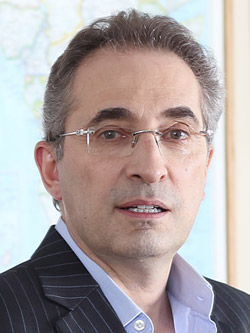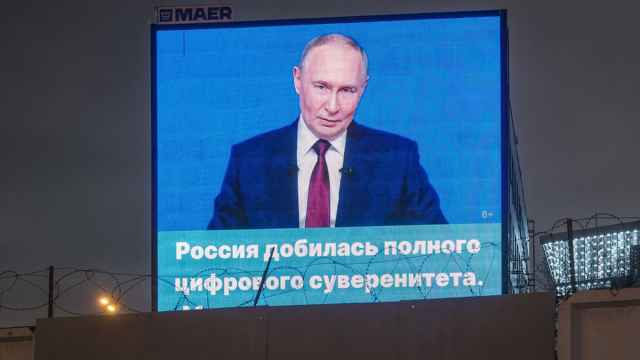The MT Conferences section did not involve the reporting or the editorial staff of The Moscow Times.

Fred Patitucci
Philip Morris International affiliates in Russia
For many years, Diversity has been related to gender balance. At Philip Morris International (PMI), Diversity goes far beyond that, since it covers the wider concept of people from different professional backgrounds, nationalities, cultures, generations, and religions. Our company strongly believes that people of heterogeneous profiles working together are able to deliver stronger results and can make a real difference in today's dynamic global economy. Diversity is a tremendous source of richness, creativity and innovation. While our employees are all different because of different profiles, PMI believes that a set of common values, attitudes and behaviours specific to the company, and in particular to Russia, is the key to understanding one another and being in tune throughout the organization. We have a workforce throughout the country made of 26 different nationalities, and this represents a formidable advantage for spotting and analysing issues, as well as for grasping business opportunities through different dimensions and perspectives. Diversity is so embedded in everything we do that it has become part of our DNA. Diversity has become a way of operating and it is deeply rooted in our culture. One can become addicted to it, as I have since I left my home country 17 years ago.
Diversity and Inclusion is on the top of the agenda of PMI's Management team and is part of our business strategy. Working in such a diverse community brings candour and empathy in everything we do. It means openness, not only in our relationships with employees, but in the way we run our business with our customers, consumers and suppliers. It helps us welcome constructively any new ideas and foster innovation, and that is how diversity influences ultimately our business results. Diversity and Inclusion is treated at PMI as a business matter and not as a "nice to have."
Getting back to the gender balance topic, PMI worldwide is very much focused on a fair balance between male and female employees. We are not at parity yet, hence we have been focusing a lot on achieving this result globally. Russia is one of the best PMI markets in terms of female representation in our Management.
At first glance, statistics may not look striking for Russia: In 2013, women represented 24 percent of the Russian workforce, despite a 4 p.p. increase from 2011. This includes the workforce of our two factories where, from a societal standpoint, women have always been underrepresented. It is worth noting that in Russia, the proportion of women increases with the level of responsibility: we have more women handling key managerial roles. For example, 40 percent of our Managers and Directors are women. If we keep on with our current trend and approach, we will go beyond the 50/50 parity within a few years. Gender representation also depends on the functions in which employees are working. While there are not enough women in the Operations function — although we have noticed major improvements in the last three years — functions such as HR, Finance, Legal, and Corporate affairs have a very high female representation, reaching more than 80 percent in some functions. Though these results are encouraging, we need more women in Operations and in our Sales force.
The company is currently undertaking a set of activities to further develop Diversity and Inclusion in the organization both on global and local levels. In Russia, we have already reached pure parity (50/50 rate) in terms of hiring newcomers for managerial positions and above.
Several initiatives have helped us in that direction. In addition to the flexi-time concept, another example is the "Remote Working" initiative we are testing at the moment. We need to address the perception that a high level of face time and 24/7 availability is a prerequisite for a successful career in our company. In the Remote Working system, an employee may work one day per week from home or from any other location, be it a park, a café or a summerhouse. The flexibility it provides is crucial not only for our female employees (those who have children especially appreciate this opportunity), but also for the younger people named "generation Y" who enjoy more freedom and try once in a while to be away from the corporate environment. Another example of our practices on Diversity and Inclusion is the sabbatical leave, which is allows an employee to take up to one year's break from work for his/her personal plans, while formally remaining employed by the company.
In the end, all this helps to have employees with a higher level of engagement and motivation and, ultimately, has a clear and strong impact on our business performance, share of market and profitability. Diversity and Inclusion has still many successful years to go in our Company.
The MT Conferences section did not involve the reporting or the editorial staff of The Moscow Times.
A Message from The Moscow Times:
Dear readers,
We are facing unprecedented challenges. Russia's Prosecutor General's Office has designated The Moscow Times as an "undesirable" organization, criminalizing our work and putting our staff at risk of prosecution. This follows our earlier unjust labeling as a "foreign agent."
These actions are direct attempts to silence independent journalism in Russia. The authorities claim our work "discredits the decisions of the Russian leadership." We see things differently: we strive to provide accurate, unbiased reporting on Russia.
We, the journalists of The Moscow Times, refuse to be silenced. But to continue our work, we need your help.
Your support, no matter how small, makes a world of difference. If you can, please support us monthly starting from just $2. It's quick to set up, and every contribution makes a significant impact.
By supporting The Moscow Times, you're defending open, independent journalism in the face of repression. Thank you for standing with us.
Remind me later.





